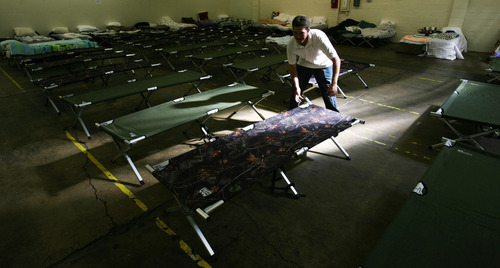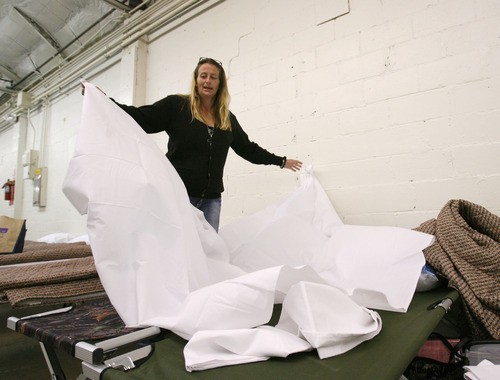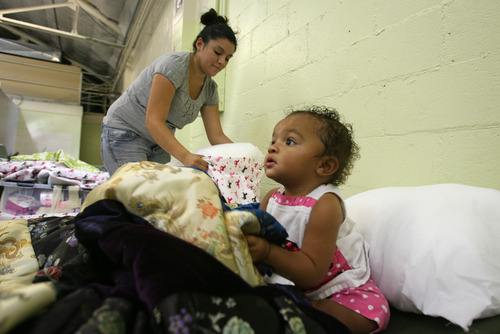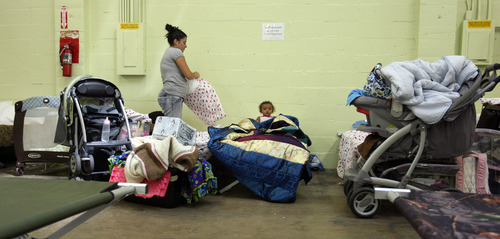This is an archived article that was published on sltrib.com in 2012, and information in the article may be outdated. It is provided only for personal research purposes and may not be reprinted.
Midvale • Monday was beautifully warm and sunny but the Road Home, Salt Lake City's downtown homeless shelter, opened its winter facility in Midvale where 65 families are finding a temporary home weeks before the snow flies.
The cinder-block warehouse, at 529 W. 9th Avenue, used to take in the homeless community's overflow population during the winter months, opening its doors on Nov. 1. But a surge in numbers of desperate families began bumping that date earlier in 2010.
"We've been in an upward trend for the last 3 years," said Road Home Executive Director Matt Minkevitch. "We're on track to again surpass any previous records. If we go back about six years, we've had a 300 percent increase in the number of families that we're serving."
So far, in 2012 Utah's largest homeless facility has served 709 families. Years ago, they wouldn't see that demand in a two-year period, Minkevitch said.
"Family homelessness has increased significantly and disturbingly," Minkevitch said of the growing trend manifesting itself throughout the country.
Michelle Webster, 46, readied two cots for herself and her five-year old son Michael. He is one of four children, but 18 years separate him and his next older brother, she said.
"I was a baby having babies," Webster said of her first pregnancy at age 16, which interrupted her education. She later finished her high school training while doing jail time. Now divorced twice, she plows ahead in a tough economy as a single parent, working on a plan to find a job and put food on the table.
"A lot of these people have lost everything," Webster said of the parents and children settling in around her. "It's kind of hard to hold on to stuff when you're just trying to keep your head above water and feed your little mouths."
Without the Road Home and public assistance programs available through state agencies, Webster said that she and her son would be on the streets.
"I'm grateful," Webster said of the "hand-up" she's receiving, "and I hope that everybody makes it out of here."
According to Minkevitch, most will. Unfortunately, a flood of families with continue to flow through the shelter for awhile.
"The odds are 90 percent in their favor that the people here today will move out of this shelter and never come back again," Minkevitch said. "It's just too bad that we have others coming to us at the same time."
Rapid rehousing funds, a valuable tool initially provided through federal stimulus dollars, will cover a few months rent and utility costs for many of these families so they can quickly relocate into area apartments.
Rachel Jeffers, 22, held on to that hope as she claimed cots for herself and her 1-year-old daughter Keiana. Her son, 3, was spending the day with his father but will soon join his mother and sister at the shelter.
The family's downhill slide began in May when Jeffers took maternity leave, did not return to work in time and subsequently lost her job. She found another job, but finances had already spiraled out of control and soon the young family lost their car and apartment — and everything else.
"Then we had no choice but to come here," Jeffers said. She previously managed a fast-food franchise, where she made $10 per hour and worked plenty of overtime.
Sharing a large concrete warehouse with dozens of roommates can be daunting, although the facility touts an on-site laundry and large kitchen with several stoves, refrigerators and shelves stacked with canned foods and jars of peanut butter.
"I just have to take it day by day," Jeffers said. "It's all a challenge — from knowing what you're going to feed your kids to trying to accomplish something to get yourself out of here."
Jeffers acknowledged feeling trapped and alone at times. But one look at her kids strengthens her resolve to stay positive and forge ahead.
"I know that if I'm not happy, then they're not going to be happy," Jeffers said.
Downy Zuver, Road Home case manager, said that 198 new cots so far have been set up at the Midvale warehouse. The ability for families to do laundry and prepare their own food there provides a bit more stability than the downtown shelter, she added.
"It's kind of its own little community," Zuver said. "For the most part they try to help each other out. They babysit each other's kids and become friends."
Minkevitch remains upbeat about the many challenges the homeless community faces.
"These are problems with solutions," he said, adding that more federally subsidized housing vouchers would be a giant step forward in reducing homelessness.
"Housing is just too expensive," Minkevitch said. "Especially for folks with incomes as challenged as those who are coming to us."
Twitter: @catmck —
How to help:
Diapers, baby wipes, formula, hygiene items of all types, chapstick, lotion, socks, underwear, blankets, warm clothing, non-perishable food items.
Donations are accepted any time at the Road Home's overflow shelter, 529 W. 7300 South, Midvale. For more information, call 801-819-7296 or email donations@theroadhome.org.









